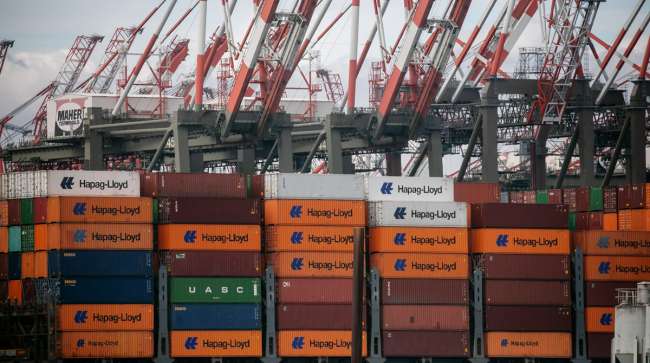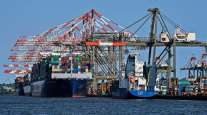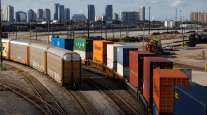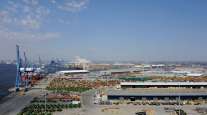Bloomberg News
Farmers Brace for Supply Chain Delays as Dock Strike Begins

[Stay on top of transportation news: Get TTNews in your inbox.]
The now-underway strike of U.S. dockworkers is threatening to disrupt U.S. grains and other commodity exports at a crucial time for American farmers seeking to sell bumper harvests.
The strike, which began Oct. 1 at East and Gulf Coast ports, risks upending shipments to China and other key destinations just as the harvest season gets underway. Concurrently, congested railroad traffic and low water levels on the Mississippi River are complicating crop movement.
The supply chain can either be a facilitator of farmer profitability or it can be an obstacle to it, said Mike Steenhoek, executive director of the Soy Transportation Coalition. “Unfortunately, the current supply chain is an obstacle to farmer profitability.”
Growers already have been struggling with declining farm incomes because of high input costs, global competition and low commodity prices. The Conference Board estimates a strike could cost the U.S. economy $540 million a day.
The U.S. National Grain and Feed Association and 55 other trade groups last week pressed President Joe Biden to avert port disruptions, warning that labor strikes would harm the agriculture supply chain and broader economy.
TT's Seth Clevenger and Erika Voss of DAT Freight and Analytics discuss crucial strategies and best practices for safeguarding information and assets in a high-demand period. Tune in above or by going to RoadSigns.ttnews.com.
A strike would directly impact the shipment of containers, which account for almost 10% of grain and the bulk of cotton and meat exports from the U.S., according to USDA data. Additionally, ripple effects throughout the supply chain could affect shipments of other commodities.
As the harvest season gets underway, even the slightest delay in moving American products efficiently has a disruptive and harmful effect on the supply chain and economy, Mike Seyfert, the NGFA’s CEO, said last week.
Biden said Sept. 29 he wouldn’t intervene in any dockworkers strike. Resolving the dispute is a matter for collective bargaining, he told reporters in Delaware.
Rail Relief
The disruption comes as the supply chain got some relief Sept. 30, when BNSF Railway Co. said it will allow the resumption of grain shipments to Mexico — the U.S.’s top importer. BNSF in late August stopped issuing permits for grain shuttle trains to Mexico due to congestion and train backlog, while Union Pacific Railroad Co. took a similar move on Sept. 18.
BNSF said it will resume issuing such permits beginning Oct. 1, with distribution based on the “fluidity of the pipeline.” Union Pacific didn’t immediately respond to a request for comment.
Want more news? Listen to today's daily briefing above or go here for more info
Meanwhile, river traffic is being affected as drought hits the Mississippi River. Last year, when river levels were also low, barge rates rose to multiyear highs and exporters were able to send products by train to ports in the Pacific Northwest. This year, rail congestion and possible port strikes make that option more problematic.
According to the USDA, barge rates downriver are at their highest level since September of last year. As Mississippi waters recede, barge companies such as American Commercial Barge Line are reducing vessel weight, making shipment even more expensive.
These logistical issues are occurring at the end of the year, when transportation costs typically rise because of greater demand to move recently harvested crops. This year’s supply chain complications threaten to push costs even higher, further reducing the competitiveness of American exports compared with those from Brazil and Argentina.





